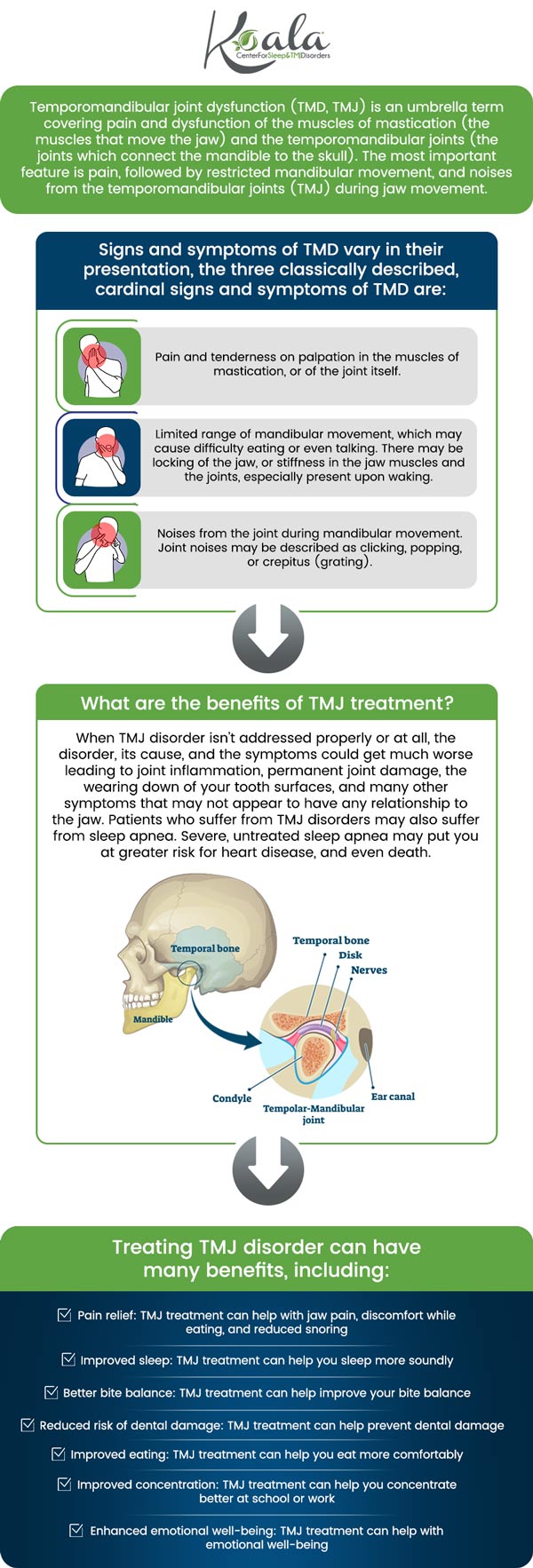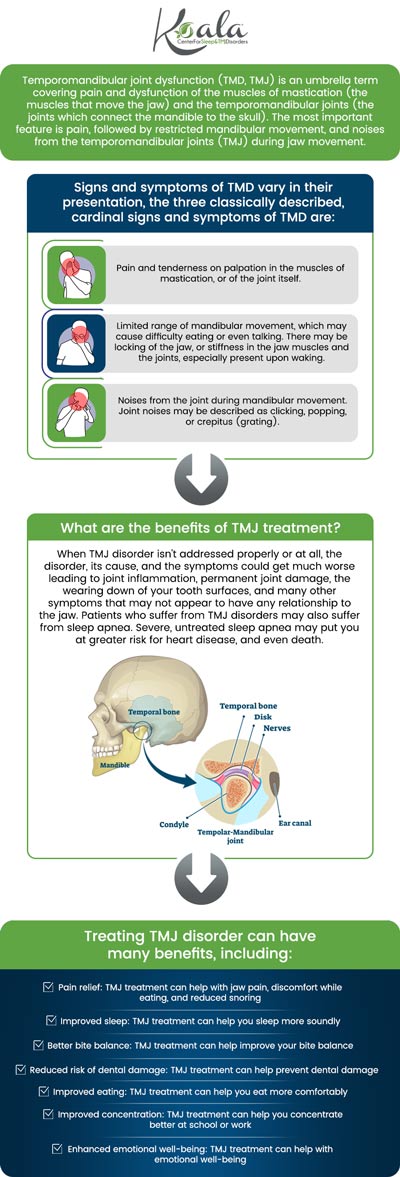TMJ And Teenagers: Treatment Options Q&A
If your teenager is having difficulty opening or closing the mouth, earaches or ringing’s or frequent headaches along with jaw pain, fatigue, jaw locking, or swelling, it could be TMJ. Visit the Koala Center for Sleep & TMJ Disorders for comprehensive treatment.. For more information contact us or book an appointment online. We have convenient locations across the U.S. in Bloomington IL, Peoria/Dunlap IL, El Paso TX, and Wausau WI.




Table of Contents:
Why Teenage Patients Have More TMJ Problems in the Springtime?
How Can You Prevent TMJ Disorders in Spring?
What are the symptoms of a TMJ disorder in kids?
How is the TMJ problem managed in teens?
Due to the high-stress nature of this season, teenage patients often have more TMJ problems in the springtime. When people are stressed, they tend to subconsciously clench and grind their teeth, such as when they are asleep. As springtime brings along exams, prom, and other major events, your teen is more likely to experience TMJ symptoms.
While it’s common for teens to experience TMJ concerns during springtime, their discomfort is usually caused by muscle tension rather than joint misalignment or degeneration.
Typically, if teens complain of pain behind the molars, it is related to muscle strain around the TMJ. If your teen complains of TMJ pain, it’s essential to bring them in for an evaluation with a specialist. The experts at our clinic can alleviate your child’s discomfort to help them enjoy this busy time of year.
To prevent TMJ flare-ups, it’s important to keep the following things in mind:
– Destress – The most common cause of TMJ issues, especially in the springtime, is stress. Stress makes people clench their jaws and grind their teeth, which puts pressure on the TMJ and surrounding muscles. While easier said than done, stress reduction techniques are highly effective for preventing TMJ-related pain.
– Avoid hard or chewy foods – Eating certain things, such as gum, candies, and ice, can cause strain on the TMJ. It’s recommended to steer clear of such foods to avoid overworking this joint.
– Avoid dehydration – As it decreases joint lubrication, dehydration can cause a TMJ flare-up. It’s advised to drink plenty of water and eat high-water-content foods, like fruits and vegetables, to avoid discomfort.
– Be mindful of posture – Poor posture can cause tension to build in the TMJ, so it’s advised to do posture exercises or see a physical therapist.
– Take vitamin D – As a deficiency in vitamin D can cause muscle pain, you can take supplements to limit TMJ flare-ups.
By keeping these tips in mind, you can help your kids stay TMJ pain-free during the springtime.
Various TMJ disorder symptoms commonly appear in children. If you notice any of the following symptoms, you should have your child evaluated by a TMJ specialist:
– Difficulty opening or closing the mouth, or both.
– Earaches or ringing in the ears.
– Unexplained headaches.
– Jaw pain.
– Jaw fatigue.
– Locking of the jaw.
– Asymmetrical jaw opening.
– Swelling around the TMJ.
– Pain when touching around the TMJ.
– Radiating neck, facial, or shoulder pain.
– Pain when chewing or yawning.
– Popping or clicking noises when moving the jaw joint.
These symptoms often indicate the presence of a TMJ disorder in kids. The dedicated team at Koala Center for Sleep & TMJ Disorders specializes in supporting youth affected by this condition. Our experts will perform a thorough evaluation and develop a personalized treatment plan to ensure swift pain relief for your child.
TMJ problems can be managed in several ways, depending on the severity of the concern. Often, a combination of approaches is used to deliver comprehensive relief. When it comes to treating TMJ problems, there are two categories of treatment: reversible and irreversible. In the majority of cases, teens with TMJ pain experience relief through mild, reversible therapies. Occlusal appliance therapy is the most common treatment for TMJ problems in adolescents.
Occlusal appliance therapy involves the use of a splint or mouthguard to protect the teeth and the TMJ from harmful habits, like grinding the teeth during sleep. In addition to occlusal appliance therapy, physical therapy and medications are also often prescribed to teens with TMJ concerns. These methods are highly effective approaches to pain relief.
To find out which treatment approach is best for your teen’s circumstances, schedule an appointment at the Koala Center For Sleep & TMJ Disorders. Our providers will assess your child’s symptoms to create a comprehensive approach to managing their TMJ concerns.

Additional Services You May Need
▸ KoalaKIDZzz®
▸ Sleep Apnea
▸ Snoring
▸ TMJ Disorder
▸ Fatigue
▸ Sleep Disorders
▸ Weight Loss
▸ CPAP Alternative
▸ Oral Appliances




